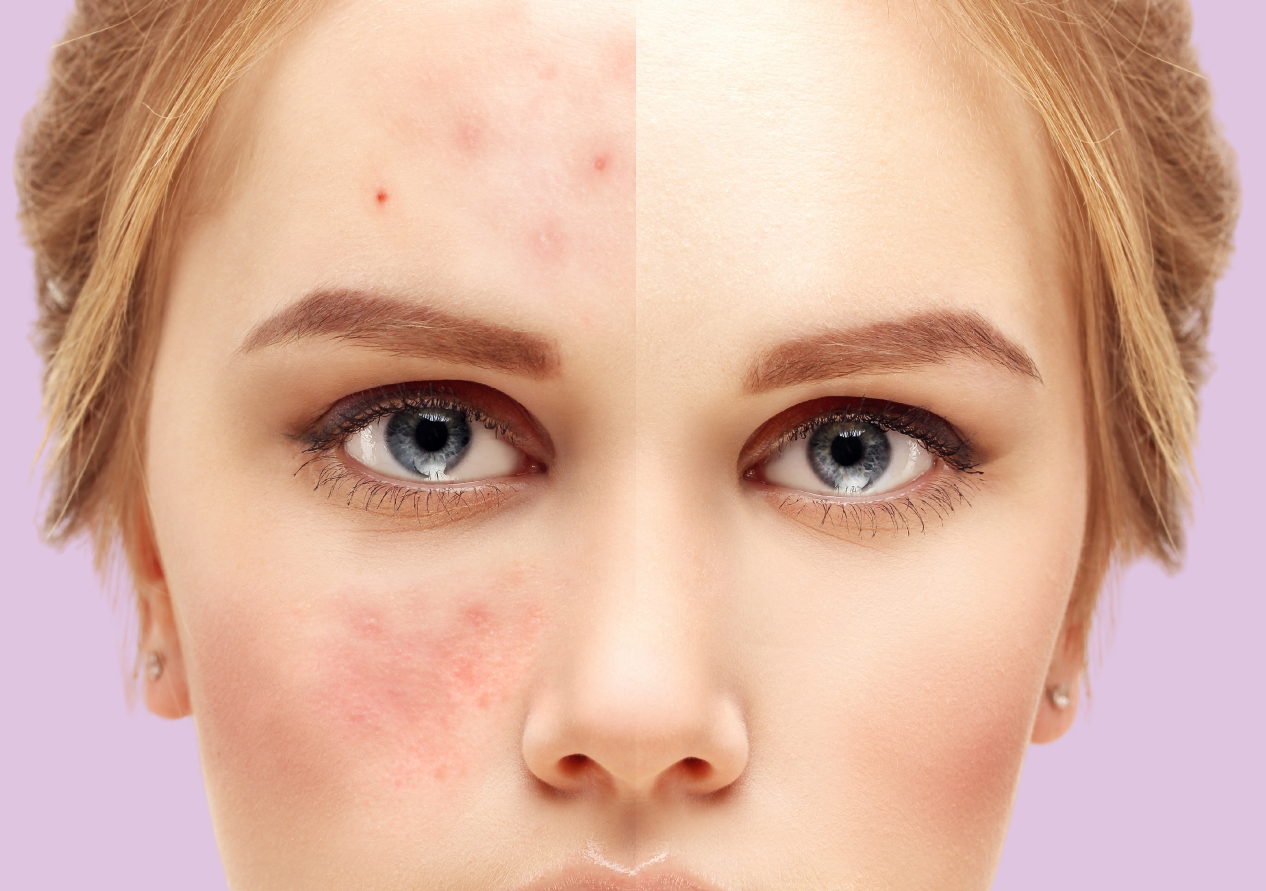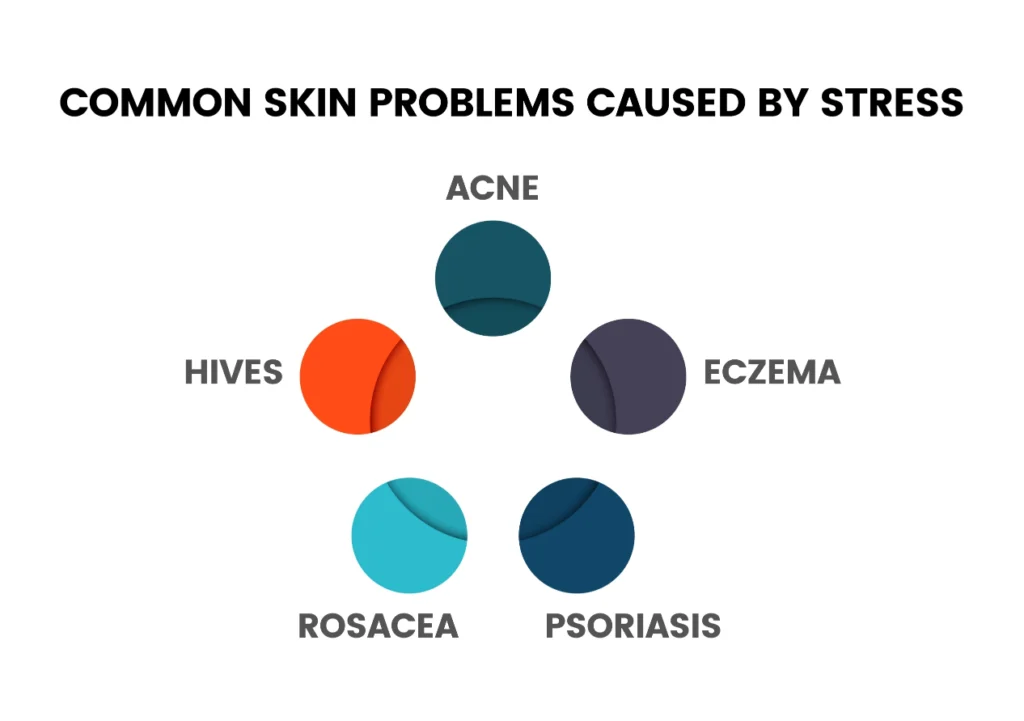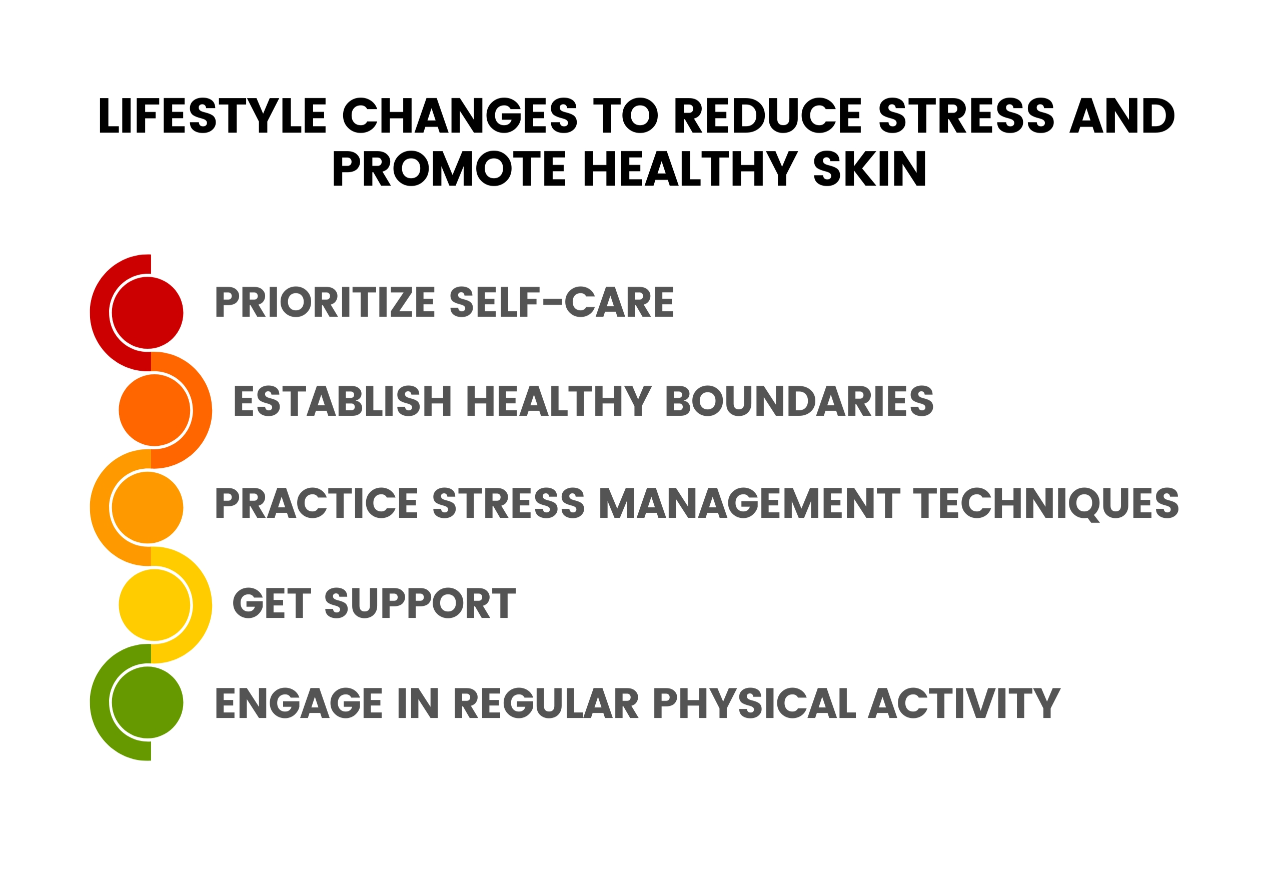
Stress is an inevitable part of our lives, and it can affect us in many ways, including our skin. If you’ve ever experienced a breakout just before a big event or noticed that your eczema worsens during a particularly stressful period, you’re not alone. The hidden link between stress and skin problems is becoming increasingly evident, and it’s important to understand how these two are interconnected.
When we experience stress, our bodies release hormones like cortisol, which can wreak havoc on our skin. This can lead to a variety of skin issues, including acne, rosacea, eczema, and psoriasis. Furthermore, stress can prolong the healing process of existing skin conditions, making them more difficult to manage.
In this article, we’ll delve into the impact of stress on the skin, exploring the scientific research behind this connection. We’ll also provide practical tips and strategies to help you better manage stress and support your skin’s health.
Don’t let stress take a toll on your skin. Read on to discover the hidden link between stress and skin problems and what you need to know to maintain healthy, glowing skin even in the most challenging times.
How Stress Affects Skin Health

Stress is an inevitable part of our lives. Whether it’s due to work deadlines, relationship issues, or financial pressures, we all experience stress at some point. However, what many people don’t realize is that stress can have a profound impact on our skin health. When we’re stressed, our bodies release hormones like cortisol, which can wreak havoc on our skin.
One of the most common ways stress affects our skin is by triggering breakouts. When cortisol levels rise, it stimulates the production of oil in our skin, leading to clogged pores and ultimately, acne. Moreover, stress can exacerbate existing skin conditions such as eczema, psoriasis, and rosacea. Individuals with these conditions often notice that their symptoms worsen during periods of high stress.
In addition to breakouts and flare-ups, stress can also slow down the healing process of our skin. When we’re stressed, our bodies prioritize survival over repair, which means that cuts, wounds, and blemishes take longer to heal. This can be frustrating for those dealing with skin issues, as it prolongs the duration of their condition and makes it more difficult to manage.
Understanding how stress affects our skin is the first step in finding effective solutions. By recognizing the impact stress has on our skin health, we can take proactive measures to manage stress and support our skin’s well-being.
If you’re noticing how to treat acne between eyebrows, it might be time to consider how stress impacts areas prone to oiliness and breakouts.
Common Skin Problems Caused by Stress

Stress can manifest in various skin problems, and it’s important to be aware of the potential issues that can arise. Here are some of the most common skin problems caused by stress:
Acne
Stress can trigger or worsen acne breakouts by increasing the production of oil in our skin and promoting inflammation. This can lead to painful, inflamed pimples that are difficult to manage.
Eczema
Individuals with eczema often experience flare-ups during stressful periods. Stress can weaken the skin’s barrier function, making it more prone to dryness, itching, and inflammation.
Psoriasis
Stress is a known trigger for psoriasis, a chronic autoimmune condition characterized by red, scaly patches on the skin. Stress can exacerbate existing psoriasis symptoms or lead to new flare-ups.
Rosacea
Stress can cause rosacea flare-ups, which are characterized by redness, flushing, and visible blood vessels on the face. Stress-induced rosacea can be particularly challenging to manage, as stress itself can worsen the condition.
Hives
Stress can also trigger hives, which are itchy, raised bumps on the skin. These hives can appear suddenly and may come and go in response to stressors.
Recognizing the specific skin problems that can arise from stress is essential in developing an effective skincare routine and stress management plan.
The Science Behind The Stress-Skin Connection

The link between stress and skin problems is not just anecdotal; it is supported by scientific research. Studies have shown that stress directly affects the skin through various mechanisms.
When we’re stressed, our bodies release stress hormones like cortisol, which can increase oil production in the skin. This excess oil can clog pores and lead to acne breakouts. Additionally, cortisol can impair the skin’s ability to retain moisture, resulting in dryness and irritation.
Furthermore, stress can trigger inflammation in the body, including the skin. Inflammation is a key factor in many skin conditions, including eczema, psoriasis, and rosacea. By promoting inflammation, stress can worsen existing skin problems and make them more difficult to manage.
Stress also affects the skin’s barrier function, which is responsible for keeping moisture in and irritants out. When we’re stressed, the skin’s barrier can become compromised, leading to increased sensitivity, dryness, and a higher risk of developing skin issues.
Understanding the scientific basis of the stress-skin connection can help individuals suffering from stress-related skin problems seek appropriate treatments and make informed lifestyle choices.
Skincare Routine for Stressed Skin

When your skin is under stress, it’s important to provide it with the care and attention it needs. Having a skincare routine tailored to stressed skin can help alleviate symptoms and support the healing process. Here are some key steps to include in your skincare routine for stressed skin:
Gentle Cleansing
Use a mild, non-irritating cleanser to cleanse your skin twice a day. Avoid harsh cleansers that can strip away the skin’s natural oils, as this can exacerbate dryness and sensitivity.
Moisturize
Apply a hydrating moisturizer after cleansing to replenish the skin’s moisture barrier. Look for moisturizers that contain ingredients like hyaluronic acid or ceramides, which help lock in moisture.
Protect with SPF
Even when stressed, it’s important to protect your skin from harmful UV rays. Choose a broad-spectrum sunscreen with an SPF of 30 or higher and apply it daily, regardless of the weather.
Avoid Harsh Ingredients
Steer clear of skincare products that contain harsh ingredients like alcohol, fragrances, and sulfates. These can further irritate stressed skin and worsen existing skin problems.
Spot Treatment
If you’re experiencing breakouts, consider using a spot treatment with ingredients like salicylic acid or benzoyl peroxide to target individual blemishes.
Remember, consistency is key when it comes to skincare routines. Stick to your routine and give your skin time to respond to the products you’re using. Be patient and adjust your routine as needed to find what works best for your skin.
Developing a simple skincare routine is crucial for maintaining skin health during stressful times, focusing on gentle cleansing and proper hydration.
Professional Treatments for Stress-Induced Skin Issues

In some cases, stress-induced skin problems may require professional treatments to effectively manage and alleviate symptoms. Consulting with a dermatologist or skincare professional can help you explore suitable options tailored to your specific needs. Here are some professional treatments that may be beneficial:
Topical Medications
Dermatologists can prescribe topical medications that target specific skin conditions such as acne, eczema, or psoriasis. These medications can help reduce inflammation, control oil production, and speed up the healing process.
Light Therapy
Light therapy, also known as phototherapy, involves using specific wavelengths of light to treat various skin conditions. It can be particularly effective for psoriasis, eczema, and acne. Light therapy can be administered in a dermatologist’s office or through at-home devices.
Chemical Peels
Chemical peels involve the application of a chemical solution to the skin, which causes the top layer to peel off. This treatment can help improve the appearance of acne scars, reduce hyperpigmentation, and enhance overall skin texture.
Laser Treatments
Laser treatments can target specific skin concerns such as acne scars, rosacea, or hyperpigmentation. These treatments use laser technology to stimulate collagen production, reduce redness, and improve skin tone and texture.
It’s important to consult with a professional to determine which treatments are most suitable for your specific skin condition and overall health.
For those near Arlington, exploring Arlington’s acne HydraFacial treatment could be a pivotal part of managing your skin’s response to stress.
Lifestyle Changes to Reduce Stress and Promote Healthy Skin

In addition to skincare routines and professional treatments, making lifestyle changes can significantly reduce stress and promote healthy skin. Here are some lifestyle adjustments you can consider:
Prioritize Self-Care
Carve out time for activities that bring you joy and help you relax. Whether it’s practicing hobbies, spending time with loved ones, or engaging in mindfulness exercises, self-care can help reduce stress and improve your overall well-being.
Establish Healthy Boundaries
Learn to say no when you feel overwhelmed and prioritize your own needs. Setting boundaries can help reduce stress and prevent burnout.
Practice Stress Management Techniques
Incorporate stress management techniques into your daily routine, such as deep breathing exercises, meditation, or journaling. Find what works best for you and make it a regular practice.
Get Support
Reach out to friends, family, or a therapist for support when you’re feeling stressed. Talking about your feelings and concerns can help alleviate stress and provide a fresh perspective.
Engage in Regular Physical Activity
Regular exercise not only improves physical health but also promotes mental well-being. Find an activity you enjoy, whether it’s going for a walk, practicing yoga, or participating in a team sport.
By making these lifestyle changes, you can reduce stress levels and support your skin’s health from the inside out.
Conclusion: Taking Care of Your Mental and Physical Well-Being for Radiant Skin
The hidden link between stress and skin problems is a significant and often overlooked aspect of skincare. Understanding how stress affects our skin is crucial in developing effective strategies to manage stress and support our skin’s health.
By implementing stress management techniques, incorporating natural remedies, and following a skincare routine tailored to stressed skin, you can minimize the impact of stress on your skin and promote a healthy, radiant complexion. Additionally, seeking professional treatments and making lifestyle changes can further support your skin’s well-being.
Remember, taking care of your mental and physical well-being is not only essential for your skin but also for your overall quality of life. Prioritize self-care, seek support when needed, and embrace healthy habits to ensure that stress doesn’t take a toll on your skin or your well-being.
To ensure you’re taking the best care of your skin, consider to book for our skincare services in Virginia, where personalized care routines meet professional expertise.
